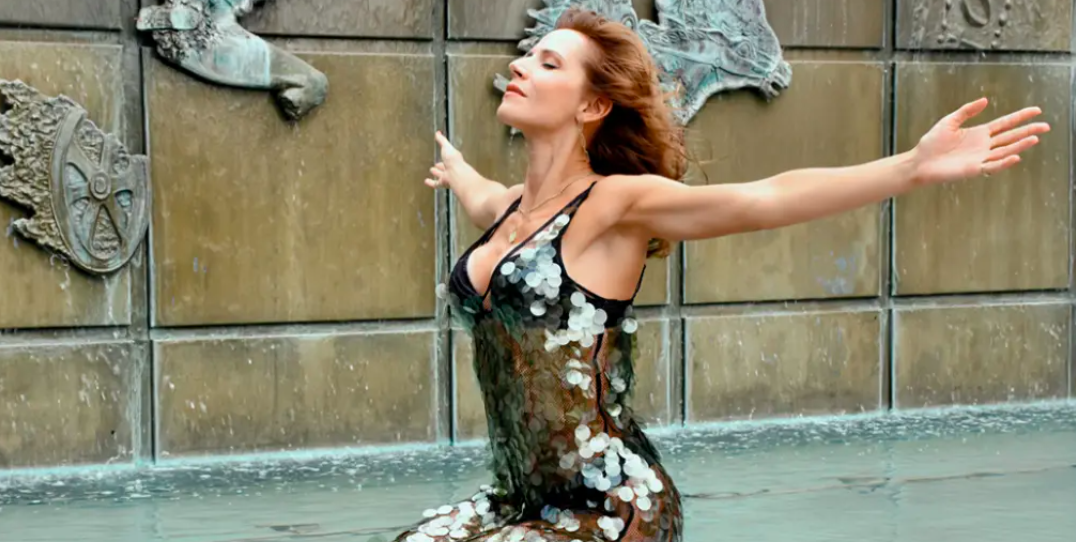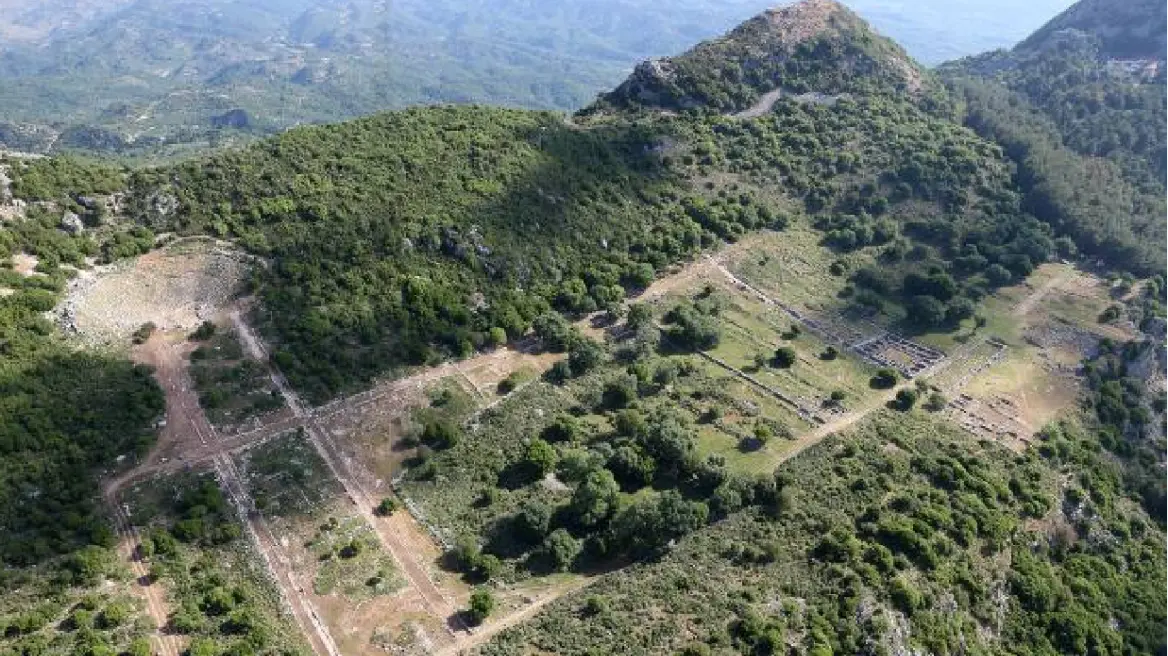I first met her in 2014 as an entertainer at Madame Tussauds Museum, among wax figures of celebrities, just as her first short film was hitting theaters. I photographed her on the 10th floor of the Tate Modern with all of London at her feet. Was it prophetic? Certainly. Seven years later, we met again in a pole dancing class. At the “BFI Riverfront,” a favorite restaurant for cinephiles and artists, we opened a bottle of champagne and poured a little into the Thames, making a wish. It came true.
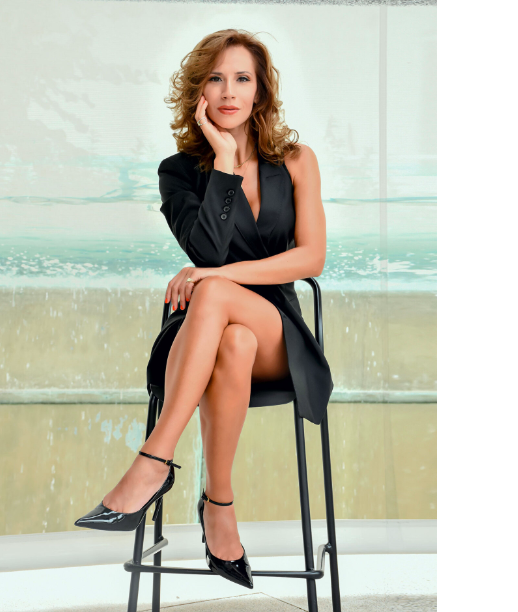
Two years later, this year, she plays the role of a seductive pole dancer alongside the renowned British actor David Bark-Jones in “Sparrow’s Call,” her first feature-length film, for which she also wrote the script. The film won an award at this year’s London Independent Film Festival, participated in the 2024 Pune International Film Festival, and was screened as the closing film at the Panorama of European Cinema in Athens. It is set to be released in Greek theaters on September 26, but Vasiliki is already thinking about her next step.
GALA: With a small flashback, how would you tell your story up to today?
Vasiliki Vlachou: A little girl watches films with awe. She dreams of starring in an English-language movie. She studies, works in her home country, Greece, and then leaves for abroad—London—armed only with a determination rooted in fearlessness. Facing obstacles and challenges, she clings almost obsessively to her dream, and just before giving up due to exhaustion, she sees it come true. To be continued.
G.: What is your film about?
V.V.: “Sparrow’s Call” explores the unconventional relationship between Mike, a British family man and Philosophy lecturer, and Val, his immigrant mistress who works as a nightclub dancer. Their relationship takes a criminal turn, putting Mike’s marriage and career at risk. Val is trapped in a no-way-out situation: she is responsible for her sick grandmother, unable to escape the ruthless world of nightlife, and the hope for a better life that Mike promises her slips away in the most unexpected way. Challenging stereotypes, the film raises questions and concerns about gender inequality, morality, and exploitation.
G.: How would you describe your approach to relationships?
V.V.: I respect my relationships. I treat others with honesty, avoiding rudeness and constant criticism, showing generosity, and most importantly, keeping an open mind.
G.: Have you been more often the prey or the hunter?
V.V.: I would love to say I’ve only been the hunter, but in life, we inevitably play both roles. Overall, though, I feel equal to equals. I try to surround myself with people who elevate me intellectually, relax me emotionally, inspire me, and bring out my best self.
G.: Love has an undeniable beauty, but would you agree it’s a double-edged sword?
V.V.: Love is like walking a tightrope, forgetting about your safety. If you make it to the end of the rope, you find love. If you fall, you get hurt, you feel pain, but you rise even stronger. Pity those who have never been in love.
G.: Would you say you recognize any common traits with your character?
V.V.: When you portray a character that you’ve written yourself, it’s like opening a window to your soul for the world to see. The exposure is immense. Val’s strength and emotional resilience, her ability to forgive and move forward despite the wounds that have scarred her, are qualities that I also possess.
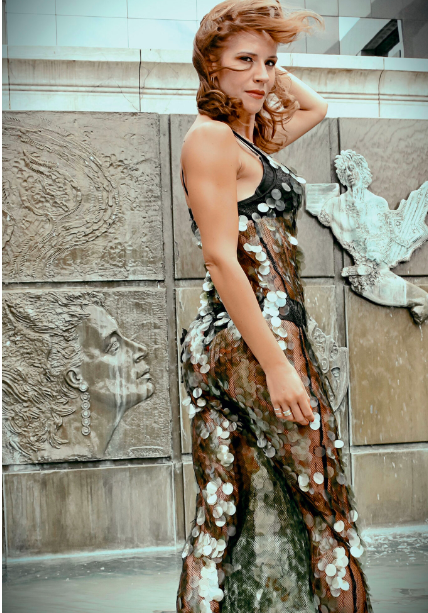
G.: How was David Bark-Jones as your co-star?
V.V.: He was recommended by the film’s casting director. David is an actor with a successful career in British theater and recent appearances in Netflix’s “Diplomat” and Marvel’s “Secret Invasion.” We had great chemistry during filming, and he was constantly asking questions about the script.
G.: How long is the journey to success and lead roles for a Greek woman in London, especially when English isn’t her first language?
V.V.: Auditions for lead roles in London are tough, not only for international actors but also for British ones. I’ve been interviewed for good roles in major projects and have starred in independent theater productions and films. However, being initially cast in stereotypical “foreign” roles pushed me to start creating my work.
G.: How does it feel to carry the weight of a film on your shoulders in the entertainment industry’s heavy machinery?
V.V.: Creating an independent film is inherently a highly challenging endeavor, especially if you want to do it professionally in a foreign country. Filmmaking is a collective effort. The heaviest burden I had to carry was to inspire an entire team of people to follow me on this journey, which lasted almost nine years.
G.: What challenges did you face in pursuing a career in London?
V.V.: I faced many difficulties, but they strengthened me as a person and gave me experiences I probably wouldn’t have gained in Greece. The jobs I did—whether related or unrelated—helped me develop a broader perspective on the world. I’ve worked with people who have won Oscars, but I’ve also encountered the most adventurous and dark sides of life.
G.: Some women, through writing scripts, have tipped the scales from male dominance to our side. Has there been any balance achieved?
V.V.: Scripts written by women are a cultural achievement. They pave the way for a more objective portrayal of the world, relationships, and human psychology, offering a balanced perspective and approach to society.
G.: How has your career in London changed you about the identity you have in Greece?
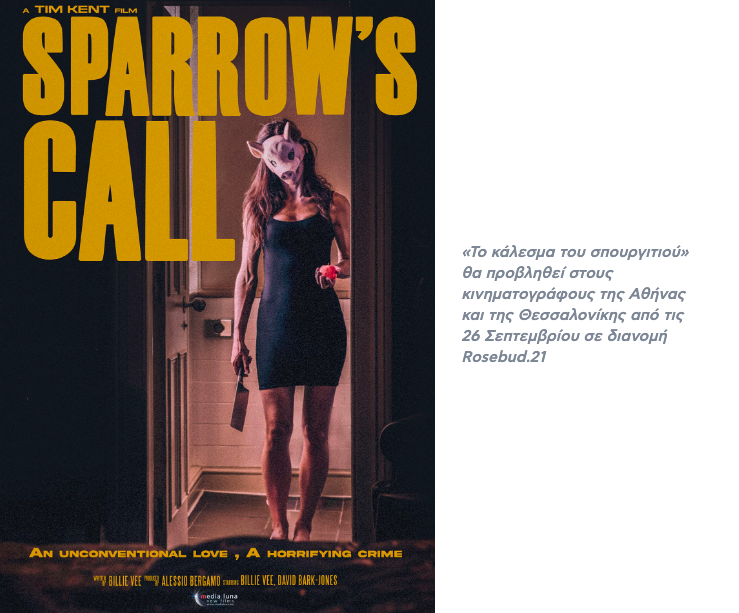
V.V.: My years in London certainly shaped my personality. I left the safety of Athens, where I was born, and moved to a foreign place where I had nothing. Creating a new social identity is liberating, but it also brings great fear—the fear of the unknown. Today, I feel enriched with experiences and knowledge, an evolved version of my old self.
G.: How does a woman who has succeeded feel?
V.V.: Satisfied, but also impatient to conquer her next goals—like some very interesting roles I’ll be auditioning for.
G.: What do you consider your greatest Greek legacy?
V.V.: The timeless wisdom of our ancient philosophers and the deep-rooted relationship we, as a people, have with theater. The blue of the sea and the sky, my mother’s pies, my grandmother’s loom. The red Easter eggs. “Filotimo” (a uniquely Greek sense of honor and pride in helping others).
Ask me anything
Explore related questions
